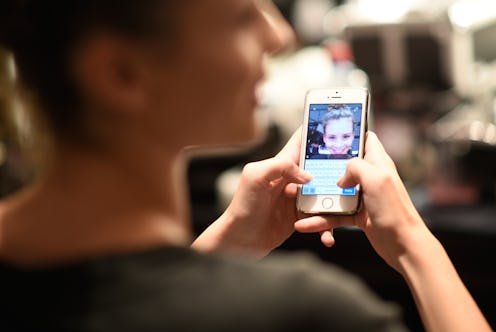
Given that we're living in the age of "fake news" and "alternative facts" (which might be more accurately described as lies and/or propaganda), it makes sense that many of us might scroll through our social media feeds and wonder: How do I know if this news is real or not? Luckily for us, recent research from Georgia Institute of Technology has some pretty incredible findings on the psychology behind how we process information online, and what traits signal to us that something should be regarded with a serious dose of skepticism. While the paper hasn't been presented just yet, their findings are legitimately enthralling — and it all has to do with the kinds of words you tweet.
To conduct their study, researchers scanned over 16 million tweets from Twitter that were linked to 1,400 major world events between the years 2014 and 2015. As you no doubt remember, a lot happened across the globe during this period; the Black Lives Matter movement gained mileage, the Charlie Hebdo attack happened in Paris, and the widespread panic and search to cure ebola around the globe, for example, are some of the heavy-hitters.
Researchers asked study participants to judge the Tweets based on credibility, ranging from "certainly inaccurate" to "certainly accurate," which is basically the mental process we all make when reading news-related information to begin with.
Then, researchers scanned the tweets for words and phrases that would put them into different linguistic categories, such as words that might boost anxiety or phrases that might incite a positive emotion from the reader. As Tanushree Mitra, the Georgia Tech Ph.D. candidate who led the research, explained to PsyPost, "Tweets with booster words, such as ‘undeniable,’ and positive emotion terms, such as ‘eager’ and ‘terrific,’ were viewed as highly credible."
On the other hand, Mitra explained, “Words indicating positive sentiment but mocking the impracticality of the event, such as ‘ha,’ ‘grins,’ or ‘joking,’ were seen as less credible. So were hedge words, including ‘certain level’ and ‘suspects.'”
Personally, what I think is even more interesting is how retweets play into the concept of credibility. For people who want to become "internet famous," you likely already know that getting a lot of retweets or "likes" on a post is a good way to gain a lot of followers. But does it make you look more credible as a news source? According to this study, not really. Researchers found that tweets with a lot of retweets were viewed as less credible by participants, possibly because people are wary of messages that attempt to create a group mentality or smooth information and ideas over too easily.
Interestingly, though, engagement on Twitter seems to help boost your credibility. In this study's findings, researchers discovered that tweets with responses and longer messages were seen as much more credible, likely because it suggests that people are willing to answer questions, clarify information, or confirm that they are a real person, not a bot, troll, or other source of spam.
To me, this research plays into an interesting realm when we consider fake news. According to the Pew Research Center, a whopping 62 percent of American adults get their news from social media. The spread of fake news can have serious implications, especially if the majority of people are getting their news from sources where fake news can run rampant.
But as other recent research in the journal Global Challenges recently found, it's surprisingly easy to fall for fake news. For example, researchers from Yale, Cambridge, and George Mason Universities discovered that how true something is makes little difference, provided that the facts (in this case, fake news) simply appear believable. In their study, they used a fake statistic to imply that a large number of scientists are against climate change. With no other information or context, study participants were willing to believe that climate change is not man-made, because those scientists supposedly believe it is not.
People are susceptible to believing "facts," provided they're introduced with a citation we trust: Scientists, data, statistics, and so on are signifiers that something is a "real" fact, and are all too easy to fall for without outside information and digging. Always remember to do your research instead of just taking things at face value — and maybe make an attempt to inoculate yourself against fake news while you're at it.